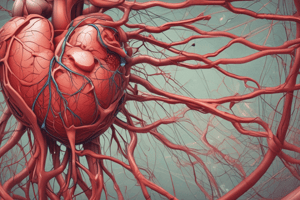Podcast
Questions and Answers
What can result from increased arterial stiffness in older adults?
What can result from increased arterial stiffness in older adults?
- Decreased risk of stroke and heart failure
- Widened pulse pressure (correct)
- Enhanced baroreflex responses
- Constant diastolic pressure
How can altered coupling of the left ventricle (LV) and arterial system affect older adults?
How can altered coupling of the left ventricle (LV) and arterial system affect older adults?
- Improve baroreflex responses
- Reduce LV function (correct)
- Enhance myocardial responses
- Decrease arterial stiffness
How does aging affect the body's ability to regulate blood pressure through baroreflex and autonomic reflexes?
How does aging affect the body's ability to regulate blood pressure through baroreflex and autonomic reflexes?
- Enhances lusitropic myocardial responses
- Improves autonomic reflexes
- Increases chronotropic responses
- Results in blunted baroreflexes (correct)
What is a consequence of attenuated baroreflex and autonomic reflexes in older adults?
What is a consequence of attenuated baroreflex and autonomic reflexes in older adults?
How does understanding cardiovascular physiology in older adults contribute to disease prevention?
How does understanding cardiovascular physiology in older adults contribute to disease prevention?
What does research in the field of cardiovascular physiology in older adults aim to achieve?
What does research in the field of cardiovascular physiology in older adults aim to achieve?
Which layer of cells lining the blood vessels plays a critical role in maintaining vascular homeostasis?
Which layer of cells lining the blood vessels plays a critical role in maintaining vascular homeostasis?
What is one of the key aspects of cardiovascular physiology in older adults as highlighted in the text?
What is one of the key aspects of cardiovascular physiology in older adults as highlighted in the text?
What happens to the endothelium's ability to secrete vasoactive molecules as individuals age?
What happens to the endothelium's ability to secrete vasoactive molecules as individuals age?
How does aging impact the cardiovascular system's maximal function?
How does aging impact the cardiovascular system's maximal function?
What role does the endothelium play in maintaining vascular homeostasis?
What role does the endothelium play in maintaining vascular homeostasis?
Which type of physiological changes affect the cardiovascular system in older adults?
Which type of physiological changes affect the cardiovascular system in older adults?
Flashcards are hidden until you start studying
Study Notes
Cardiovascular physiology is the study of the function of the heart, blood vessels, and blood. It is a crucial aspect of understanding the overall health of an individual and how the body responds to stress and exercise. The cardiovascular system plays a vital role in maintaining the body's homeostasis, and changes in cardiovascular physiology, especially in older adults, can have significant impacts on health outcomes.
Aging and Cardiovascular Physiology
As individuals age, the cardiovascular system undergoes various physiological changes that affect its function. These changes can be attributed to both the natural aging process and the increased prevalence of cardiovascular disease (CVD) in older adults. The aging process leads to reduced maximal function, less reserve, and a higher likelihood of cardiovascular failure when stressed.
Endothelial Dysfunction
One of the key aspects of cardiovascular physiology in older adults is endothelial dysfunction. The endothelium, a layer of cells lining the blood vessels, plays a critical role in maintaining vascular homeostasis by balancing vasodilation and vasoconstriction, growth inhibition and promotion, anti- and pro-thrombosis, anti- and pro-inflammation, and anti- and pro-oxidation. With aging, the endothelium's ability to secrete vasoactive molecules such as nitric oxide (NO) and prostacyclin is reduced, leading to impaired vascular function.
Increased Arterial Stiffness
Age-related changes also lead to increased arterial stiffness, which can result in a widened pulse pressure with significantly low diastolic pressure without the presence of aortic regurgitation or heart failure. This increased stiffness can have detrimental effects on cardiovascular health, including increased risk of stroke and heart failure.
Altered Coupling of LV and Arterial Stiffness and Function
The left ventricle (LV) and arterial system are closely interconnected, and changes in both systems can lead to altered coupling and function. In older adults, this coupling can be affected, leading to reduced LV function and increased risk of cardiovascular events.
Attenuated Baroreflex and Autonomic Reflexes
Aging also affects the body's ability to regulate blood pressure through the baroreflex and autonomic reflexes. As a result, older adults may experience decreased chronotropic, inotropic, and lusitropic myocardial responses, as well as blunted baroreflexes, which can increase the risk of neurally-mediated and orthostatic types of syncope.
Conclusion
Understanding cardiovascular physiology in older adults is crucial for effective management and prevention of cardiovascular disease. Research in this field aims to define exercise prescription for older patients, establish prediction schema based on age-related changes, discover treatments that can ameliorate or prevent the cellular changes in cardiac myocytes with aging, restore endothelial function, and selectively reduce central arterial stiffening.
In summary, cardiovascular physiology is a complex and interconnected system that undergoes significant changes with aging. Understanding these changes is essential for optimizing cardiovascular health and preventing disease in older adults.
Studying That Suits You
Use AI to generate personalized quizzes and flashcards to suit your learning preferences.




